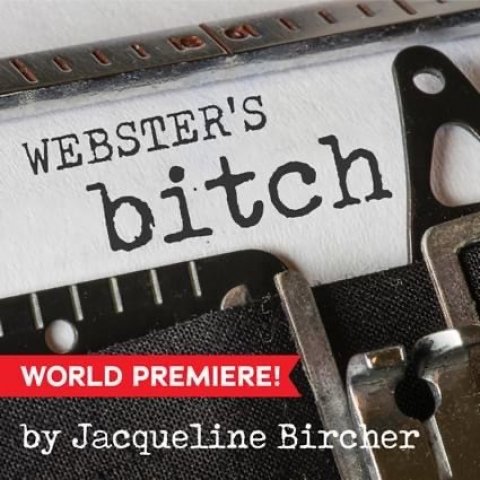Webster’s Bitch by Jacqueline Bircher
At Playhouse on Park
By: Karen Isaacs - Jun 10, 2023
Language is arbitrary, the character Gwen says in Webster’s Bitch now at Playhouse on Park through Sunday, June 18. It is simply that society has agreed on what a particular combination of letters signifies.
The world premiere play by Jacqueline Bircher attempts to deal with that arbitrariness as well as the continual change in language and meaning, the politicization of language, and what is called “cancel culture.”
It is a lot to ask one play to handle. It succeeds to some extent, but the second half tends to lose its way by bringing in corporate politics, salary inequality, and more.
The play opens in the office of Webster’s Dictionary, where Gwen and Nick are on a deadline to finish the weekly update of definitions. Gwen also handles the social media for the company. Both are being disrupted by Gwen’s sister Ellie, who is impatiently waiting for Gwen to finish so they can go from drinks. Ellie – a free-spirit — is leaving to spend a year in Nepal working on a feminist project.
As they are working, Twitter explodes with a video clip of the top executive, Frank, saying into a live mic that Joyce, their supervisor is a “bitch.” Gwen begins to try to deal with it, but soon it is, as Ellie gleefully tells her, trending. When Joyce returns to the office, they reluctantly tell her about it. She is a longtime employee and is hard-nosed. Joyce leaves to go to HR and when she returns, she tells them that sound enhancement has revealed that Frank said she was “my bitch.”
During this, Gwen and Nick are arguing about the definition of bitch. Gwen feels she should have written it and objects to Nick’s brief definition. Clearly, they, as well as Joyce and Frank, disagree on whether a definition should be concise or expansive.
It is also clear that Gwen and Nick may respect Joyce but complain about her and do not like her. You can wonder if this dislike is because she is “tough” and a woman. Would they respond the same to a tough male boss?
In the second half of the one act, approximately 100-minute play, other issues come up. Gwen is unhappy with the salary increase Joyce offers; she knows that Nick is getting what she is asking for and she feels she does more due to handling the social media. Joyce is considering an offer from a rival dictionary, which may be a ploy to get a counteroffer. Is it possible that the man Frank was talking to, who happens to be the head of the company recruiting Joyce, goaded him into the remark? And then there is cancel culture. Should one mistake cost Frank his job and reputation? We have seen it happen to others. Haven’t we all said things in private that if recorded would cause hurt to others or embarrassment?
Director Vanessa Morosco handles the large and somewhat awkward stage area well.
The scenic design by Johann Fitzpatrick (who also did the lighting design) provides an open concept office that helps keep the play moving.
The cast is sometimes hampered by characters that seem less developed and more one-dimensional. Each character is more an idea than a real person. All of them do their best to add depth to the parts, but only partly succeed.
Veanne Cox manages to imbue Joyce as more than just the “all business”, stern supervisor. You cannot imagine her going out for a drink with the others. Cox does show Joyce’s hidden vulnerability as she deals with the situation. It’s businesslike, but then you begin to see elements of hurt and awareness that she can use this to her advantage. Nick, played by HanJie Chow has the least developed character; the play ends and we still know little about him; Chow doesn’t have much to work with.
Gwen and her sister Ellie are more fully developed, but still, they are more stereotypes than real people. Director Vanessa Morosco has made Ellie, played with frantic energy by Isabel Monk Cade, the epitome of the annoying person. I was tempted to tell her to “be quiet and sit down.” She’s restless, moving constantly and rapidly around the office. Yet we know little about her except that she is dedicated to feminist and similar causes.
Gwen, obviously the older sister is the opposite; quiet, reserved, just the type of person you would picture being a lexicographer. Mia Wugraft gives her a quiet dignity, but at times seems both naïve to the realities of the corporate world as well as unassertive.
Webster’s Bitch has promise and should get other productions. I hope that before it does, the author rethinks certain aspects of the work.
If you are fascinated by words and writing, you will be talking and thinking about this play days later.
For tickets, visit PlayhouseOnPark.org

